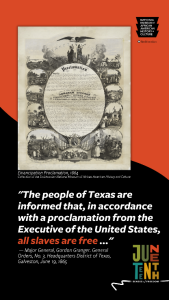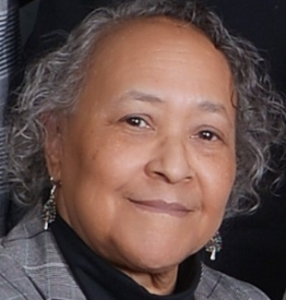In honor of Juneteenth, ELCA Racial Justice Ministries invited Dr. Dianne R. Browne, Ph.D., CFLE, CSE, Chair of the ELCA New Jersey Synod’s Anti-Racism Team to share some thoughts about this federal holiday that many mark as the official end of legalized human enslavement in the United States. For more information on Juneteenth, visit What Is Juneteenth? | HISTORY.
I am from the Northeast, so I never celebrated Juneteenth as a young person. I knew about it because my maternal grandmother was from the South. My grandmother and mother shared stories about our history and their lived experiences. At first, I was disinterested, but their conversations helped me to understand and appreciate the ongoing struggle for racial justice and equity.
Let us talk about Juneteenth in that context. The Emancipation Proclamation was enacted in 1863. On June 19, 1865, two years later, when some 2,000 Union troops arrived in Galveston Bay, Texas, the army announced that the more than 250,000 enslaved Black people in the state were free by executive decree.
Younger generations may dismiss Juneteenth as history—it happened in the past, so why is it important? Share with them that it is sankofa. That word, which comes from the Akan people of Ghana, means learning from the past to move forward in the future. We are still learning from that dream deferred in 1865. We learned to have hope, to keep moving forward and not to be deterred in our efforts for racial justice.
Talk about Juneteenth! These conversations give fodder for the never-ending quest for a sometimes elusive racial justice and equity. Know that Juneteenth was freedom overdue; that the color red, including red food on Juneteenth, is significant, as it represents the blood shed during the transatlantic slave passage; that barbecues at Juneteenth celebrations offer foods that may be representative of what was brought to Texas by the enslaved Yoruba and Kongo people in the 19th century. Keep learning and preaching to folks younger than you!
On Juneteenth, as during the Jim Crow and civil rights eras, folks had to wait. In their waiting they were compelled to do something: to keep on pushing and to act by motivating others until the dream deferred was expedited.
The Bible encourages us in our actions. Micah 6:8 calls to us in this quest, “He has shown you, O mortal, what is good. And what does the Lord require of you? To act justly and to love mercy and to walk humbly with your God” (NIV).
We know that racial justice is good and that action is needed to bring it to fruition. Encourage younger generations to press on. We are still in the struggle against a socialization that has embodied both personal and public white supremacy for generations. We are still questing for racial justice and equity, a dream deferred. We can get closer to that justice and equity through courageous intergenerational conversation.
A quote from James Baldwin sums it up: “Children have never been very good at listening to their elders, but they have never failed to imitate them.”
 Dianne R. Browne, Ph.D., CFLE, CSE, Chair, ELCA New Jersey Synod Anti-Racism Team
Dianne R. Browne, Ph.D., CFLE, CSE, Chair, ELCA New Jersey Synod Anti-Racism Team
Dianne Browne is a retired educator and trainer. Her work has focused on racial and reproductive justice, family life, and equity and inclusion. She is chairperson for the New Jersey Synod’s anti-racism team and facilitates discussions for its Transforming White Privilege curriculum. She is a member of St. Luke Lutheran Church in Willingboro, NJ.
References: National Museum of African American History & Culture
